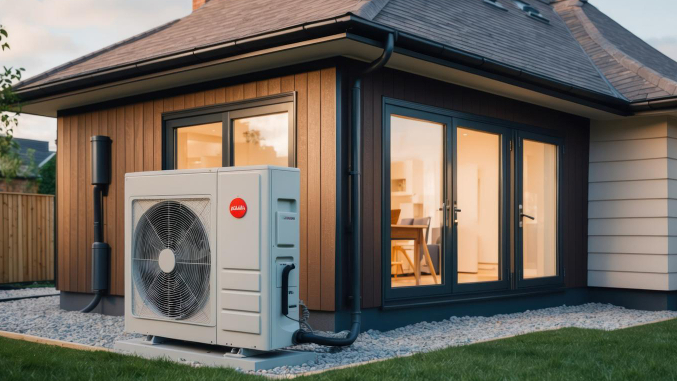Heat pumps are innovative devices that effectively transfer heat from one location to another, providing both heating and cooling for residential spaces. For homeowners in the UK, it’s important to weigh the costs against the benefits, as heat pumps can significantly lower energy expenses and promote eco-friendly living.

Understanding Heat Pumps
Heat pumps are advanced systems designed to move heat using a refrigeration cycle. They draw heat from sources like the air, ground, or water, warming the interior of a home during colder months, and then reverse the process to release heat outdoors in warmer weather.¹ This versatility makes heat pumps a smart choice for climate control. Recently, they’ve gained popularity, especially in the UK, as more homeowners seek energy-efficient and sustainable alternatives to traditional heating solutions.
Recent improvements in heat pump technology have enhanced their effectiveness and efficiency, making them an appealing option for many. Heat pumps typically boast higher efficiency ratings than conventional heating methods, generating more energy than they consume. This is especially crucial as energy costs rise and the need to minimize carbon emissions becomes more pressing.
Different types of heat pumps are available—such as air-source, ground-source, and water-source—each with distinct advantages based on the installation environment. Choosing the right type can greatly affect both performance and efficiency, so homeowners need to assess their specific needs before making a decision.
What Should UK Homeowners Budget for a Heat Pump?
When considering the financial aspect of a heat pump, UK homeowners should note that various factors can influence the price. Key considerations include the size of the property, the type of heat pump selected (like air-source or ground-source), the complexity of the installation, and any adjustments needed for existing heating systems. Regional differences in labor costs can also affect pricing. Homeowners are encouraged to compare quotes from multiple suppliers to find an option that aligns with their budget. Doing thorough research and consulting with certified installers can help ensure that the heat pump selected is both efficient and cost-effective.
How Heat Pumps Can Reduce Energy Costs for Homeowners
Heat pumps offer significant potential for energy savings. By leveraging renewable sources such as ambient air or ground heat, these systems can help decrease reliance on fossil fuels, which are often subject to price swings. The efficiency of heat pumps means that for every unit of electricity used, they can produce several units of heat, leading to lower overall energy bills.² This is particularly relevant in today’s fluctuating energy market.
Additionally, installing a heat pump can increase a property’s value. As energy efficiency becomes more important to prospective buyers, homes equipped with modern heat pump systems are likely to attract greater interest. This trend highlights the financial benefits of investing in energy-efficient technologies, which not only reduce ongoing costs but also enhance a property’s market appeal.
Advantages of Heat Pumps: Cost Savings, Emission Reductions, and Incentives
The benefits of heat pumps extend well beyond just financial savings; they are also essential for lowering carbon emissions. With the UK moving towards a low-carbon future, heat pumps play a vital role in achieving these environmental objectives. By transitioning from traditional gas or oil heating systems to heat pumps, homeowners can significantly shrink their carbon footprint and contribute to national climate change initiatives.
Moreover, many government incentives encourage the adoption of heat pumps. Programs like the Renewable Heat Incentive (RHI) offer financial support to homeowners who install renewable heating solutions, including heat pumps.³ Such incentives can substantially reduce the initial costs of installation, making them more attainable for a broader range of homeowners. As awareness of these incentives grows, an increasing number of individuals may consider heat pumps as a viable option for their heating and cooling needs.
Additionally, heat pumps are renowned for their durability and minimal maintenance needs, leading to further long-term savings. Unlike traditional heating systems that may require frequent repairs, heat pumps are designed for long-term efficiency with little intervention needed. This reliability, coupled with the potential for reduced energy bills and lower emissions, makes heat pumps an appealing investment for homeowners seeking sustainable options.
Explore More About Heat Pumps
For homeowners interested in delving deeper into the advantages and workings of heat pumps, numerous resources are available. Government publications, industry reports, and academic studies can provide valuable insights into how heat pumps can meet specific needs. Consulting with local energy advisors or contractors who specialize in heat pump installations can also offer tailored advice and guidance. As the demand for energy-efficient solutions continues to grow, staying informed about the latest advancements in heat pump technology is crucial for making well-informed decisions.
1Carrier, What Is a Heat Pump?
2Bristol Property Centre, Heat Pumps: A Smart Choice for UK Homeowners in 2024?

